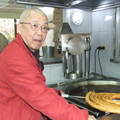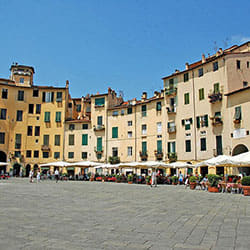
Image 1: The humanitarian taxi corridor
Their “Taxis Without Borders” plan started up after getting the Professional Taxi Federation of Madrid (FTP) to coordinate it, they spread the message via social media, drivers signed up one after the other, and then their operation to assist the Ukrainian refugees began. Altogether, the Madrid taxi convoy was made up of a total of 32 taxis: 18 standard taxis, 12 large van taxis that seat 9 passengers, plus 2 RVs. There were 66 men and women, and each car had 2 drivers so they could keep driving night and day. The plan had 2 missions, one was to bring over 25 tons of relief supplies (e.g., medical equipment, food, and clothing they had got together) on the outward trip to Poland, where Ukrainian refugees were gathering, and the other was to bring back refugees to Spain on the return trip in the emptied cars.

Photo 1
Photo 1 shows the imposing figures of the Don Quixote convoy marching first toward the north after leaving Madrid on March 11 with the relief supplies loaded and everything in place.
Initially the plan involved going to Przemyśl, which is near the Ukrainian border and where a lot of refugees had gathered, but the destination was changed to the Polish capital Warsaw because the attack by the Russians had reached the west of Ukraine, the numbers of refugees had grown, and the situation was very confused. The convoy arrived on March 13 and they delivered the relief supplies, completing their first mission.

Photo 2
Photo 2 shows a van taxi packed with as much stuff as possible. I guess the milk cartons under the seat might be for the drivers.
That left the second mission, the most difficult part of the plan: the operation to transport Ukrainian refugees. Adult males were prohibited from leaving Ukraine, which inevitably meant the passengers were women and children, and they were physically and mentally exhausted from having crossed the border while avoiding the fighting. It was a one-month-old baby in its mother’s arms who got onboard the first emptied taxi bound for Madrid at the refugee shelter, a shopping center in a suburb of Warsaw, at 11 am on March 14. There were elderly people, people in poor health, and 3 babies, so they took breaks when needed and the convoy arrived safely in Madrid 3 days later on the night of March 17, ending their long-distance mission of 6,370 km there and back. One of the participants commented, “In my whole life as a driver, this was the most fulfilling ride.”
Incidentally, the refugees evacuated to Spain were selected beforehand through the Ukrainian Embassy in Spain. A final number of 135 Ukrainians (including 1 cat and 4 dogs) were brought to Madrid, Ukrainians whose families lived in Spain or who had lived in Spain before.
The taxi drivers financed this Ukrainian rescue operation by Taxis Without Borders, which cost about 69,000 euros (8,620,000 yen), with their own funds as well as donations raised through fund-raising activities. Even the drivers’ children donated money from their piggy banks. What happens next depends on how the war pans out, but at the moment, they are considering sending the next convoy and they are fund-raising for their activities. A Madrid-Warsaw return journey costs about 1,000 to 1,200 euros (125,000 to 150,000 yen) per taxi for things like gas, highway tolls, food, and accommodation. If it can help ease even some of the unimaginable suffering of the people who have left their motherland behind, completely abandoning their former lives, and if in the first place it saves their lives, then I think that is not a high price at all.
This might be just one example of the initiatives in support of Ukraine being undertaken around the world, but I scribbled this article because one way or another I wanted to let as many people as possible know about the actions of the taxi drivers, and their family members, who have come to the aid of the Ukrainians, here in Madrid, where I live.
Yet, it’s not the first such initiative. I have witnessed previous acts of solidarity by Madrid’s taxi drivers in the past, solidarity that has left an impression on me. It was during a catastrophe 18 years ago, on the morning of March 11, 2004, when the Madrid train bombings occurred. The bombings targeted commuter trains claiming nearly 200 lives and over 2,000 casualties. With so many victims, the ambulances could not transport them all themselves, so the taxi drivers came to the rescue by volunteering to transport many of the victims. And more recently, taxi drivers volunteered to take healthcare workers to and from their homes so that they could take even a short break, as they had been stuck at hospital for days on end without being able to go home when the COVID-19 pandemic was at the peak of its devastation.
Speaking of solidarity, it was at that time when I saw neighbors applauding healthcare workers such as doctors and nurses, who were coming home for the first time in a while, instead of adopting a discriminatory approach to them, which made me keenly feel how glad I am to be able to live in this country.






























































